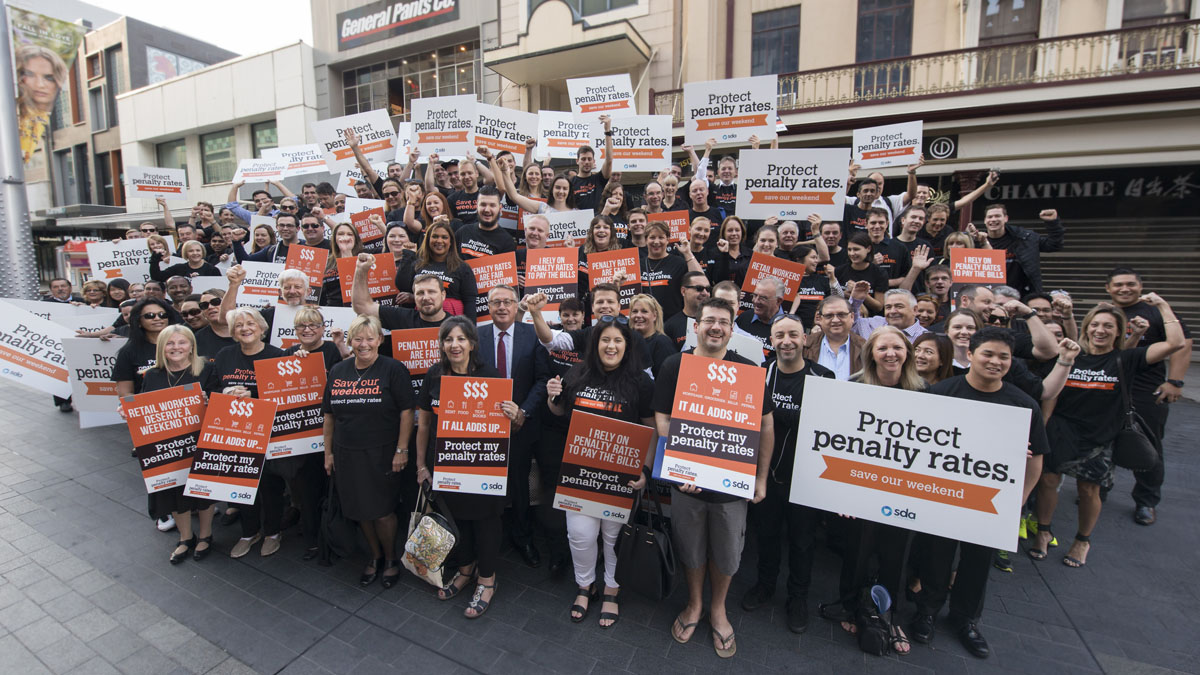As she waves through cuts to penalty rates Workplace Minister Michaelia Cash’s efforts to manipulate complex data from industrial agreements is an effort to score cheap political points (Penalty rates a big deal for small business, as two-faced Shorten knows, The Australian 15/3).
The Minister grasps at numbers to downplay the impact of the recent Fair Work Commission to reduce Sunday penalty rates, a decision that will see hundreds of thousands of workers lose up to $80 per week.
For a Government Minister, $80 may sound like petty cash, but for many retail workers this is the difference between meeting their week to week obligations or falling behind.
Minister Cash claims that the penalty rate cut will impact ‘just three or four per cent of the workforce’ as if this is a mere trifle. It will in fact undermine the wages of just under one million retail, fast food and hospitality workers including all of those who will eventually have to renegotiate their enterprise bargaining agreements in an environment of lower penalty rates and take home pay.
And legal experts are already warning that the decision opens the way for a flow-on across much broader sections of the labour market. After all, if cutting weekend penalty rates is sound economic logic in retail and hospitality, why not extend these alleged benefits to transport, manufacturing and construction, right across Australia?
Once Sunday penalty rates are cut in one major sector of the economy, its only a matter of time before business calls for them to be cut in others and after penalty rates go in these industries, why wouldn’t Liberal State governments seek to remove them for police officers, nurses and firefighters?
We know from experience that cutting penalty rates is part of the Liberal Party DNA. Less than ten years ago the Howard Liberal Government launched an all-out assault on penalty rates and workers rights through the now infamous ‘Workchoices’ reforms. While the tactics may have changed, the objective remains the same.
And contrary to the Minister’s claims, the penalty rate cut will actually hurt the very small businesses she purports to be championing. Why? Cutting penalty rates means taking dollars directly out of the pockets of people who would have spent that money at their local small business.
Slashing the incomes of low income earners who spend all of their wage, as opposed to high income earners who don’t is a sure-fire way to create an economic downturn. Regional areas will be particularly hardest hit by the penalty rate cut, with a McKell report projecting that as much as $690 million per year will be ripped from local economies, costing jobs.
Business people only hire the staff they need and cutting their wages won’t change that. Far from creating jobs or boosting the economy the penalty rate cut is a direct transfer of wealth from Australia’s lowest paid workers to business, a fact confirmed in a Citibank Report which indicated that cutting penalty rates would increase ‘earnings per share’ up to eight per cent.
Finally, the Minister’s argument that the cut to penalty rates seeks to ‘level the playing field’ between small and big business is yet another Alternate Fact. In seeking to dress up the penalty rate cut as an important economic reform for small business, the Minister conveniently fails to acknowledge that workers at large employers on EBAs actually receive higher weekly take home pay than those on the award.
In major supermarket chains employees weekly wages are $90 higher than the award rate and at Bunnings and Costco, retail workers receive a weekly wage rate $130 dollars above the award due to their EBA.
Indeed, in South Australia, small business through the ‘SDA Small Business EBA’ were offered this same opportunity to shift the value of weekend penalty rates into higher base rates of pay for workers. They walked away, revealing that their real agenda was not a fair package for their employees but rather a desire to cut take-home pay.
Discount the Minister’s spin and the proposition is pretty simple: the Sunday penalty rate cut, eagerly pursued by the business community and endorsed by the Turnbull Government is a straight cut to the take home pay for nearly one million Australians
But given the massive, justified public backlash, it is hardly surprising that no business leader or Liberal politician wants to fess up to its impact.
The problem with Fake News is that people live in the real world and for our members the reality is that years of higher wages, delivered by collective agreements have been important element in their quality of life. Stripping the system of penalty rates will do nothing to improve their lives but do everything to continue the transformation of workers into mobile units of labour.
Gerard Dwyer is the National Secretary of the SDA
Comments are closed.




